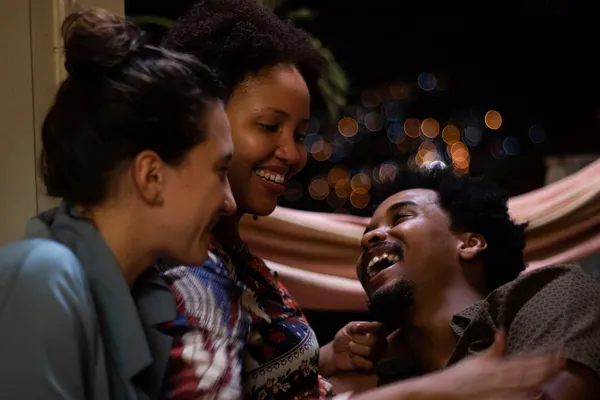Eye For Film >> Movies >> Rule 34 (2022) Film Review
Rule 34
Reviewed by: Jennie Kermode

Why do most of us obey the law even when nobody is watching? Rules of one sort or another help to create social frameworks which make interaction safer and more peaceful, but they also affect the way we think and the decisions we make. Some rules are created privately as part of a process of self-discipline or to protect us from temptation. They may not even be conscious, but when somebody suggests breaking them, we realise that they’re there.
Simone (Sol Miranda) deals with one set of rules in class as a law student and with another on the website through which she pays for her studies, working as a cam girl. She also has private rules about what she will and won’t do. These help to keep her safe at work but they bleed over into her personal life. When her girlfriend, who works in the same industry, suggests that she try bdsm, she initially responds by saying firmly that it’s against her rules. She also thinks that her girlfriend, being white, hasn’t quite grasped the semiotics of a black woman in chains. Still, something about the idea intrigues her, especially as she comes to realise that there are playful, trust-enhancing ways to approach it, and so in due course she begins to experiment. The trouble is that having done so, having broken a rule, she’s no longer sure where her boundaries lie.
There’s a lot going on in Júlia Murat’s accomplished drama, which screened as part of Newfest 2022. The presence of the law classroom makes it possible to include discussions around rules, duty, freedom and consent directly without the usual worries about making the film unrealistic, but even here, there’s more going on. A conversation about rescuing women from sex work, which takes in issues around agency and autonomy, illustrates that these future law-makers, who all seem highly privileged, see sex workers as something wholly other, never imagining that somebody with a job like Simone’s could be sitting among them.
As Simone explores new facets of her sexuality with her girlfriend and boyfriend, moving on from light spanking to cigarette burns to knife play, switching roles, gradually getting more intense, the film explores the difference between consensual and non-consensual expressions of violence and domination. She sits in on sessions aimed at providing legal advice and support to abused women. Importantly, this moves beyond a focus on beating to look at a case where other forms of control are in operation, with the team explaining to a woman that just because her husband has never hit her doesn’t mean that the situation isn’t abusive or that she lacks protection under the law. Navigating these situations proves to be more complex than they assume, however, and again we see the gulf between theory and lived experience.
It isn’t all heavy. In one scene, Simone and her girlfriend fake orgasms at each other before collapsing into laughter, taking the piss out of their customers. Most of Simone’s regulars are pretty easy going and friendly. They may be crude in expressing their desires, but they are also respectful, flattering her and thanking her, not assuming that paying means they don’t need to. When Simone decides to try bringing her new kink to work, however, she attracts a different kind of customer. Dangerous things are suggested. Bdsm has its own rules to protect against such eventualities – the mantra safe, sane and consensual - but in this context, there is big money available to those who ignore that, and furthermore, Simone is tempted by the idea to keep pushing her personal boundaries further, to explore more of herself. She doesn’t know where the edge is, and there may be only one way to find out.
In a film which is heavily informed by concerns around equality and systemic bias, Murat is highly conscious of herself as a white woman depicting a black woman in a state of bondage or submission. The film directly addresses the importance of creating new types of imagery in this regard, yet she maintains that the black people in her cast and crew were supportive and felt it important to get past the boundaries which keep black women from getting roles like this – which, in effect, risk denying their ability to make autonomous choices. Meanwhile, the choice of Miranda for the lead challenges another set of stereotypes – it’s refreshing, and refreshingly realistic, to see a woman who is not skinny shown doing this kind of work.
The casting decision is justified by a committed performance which culminates in a single, lingering shot of Miranda’s face. It’s quite a gamble to take with an inexperienced actor but it pays off, inviting viewers to play out the remaining possibilities in their imaginations, to consider not only the immediate but also the long term consequences of crossing yet another boundary and reminding us that refraining from doing so is also an active choice. In setting out to explore the desire for violence, Murat has probed more more deeply into human experience, both psychological and sociological, and she leaves her audience with a lot to reflect on.
Reviewed on: 25 Oct 2022
















